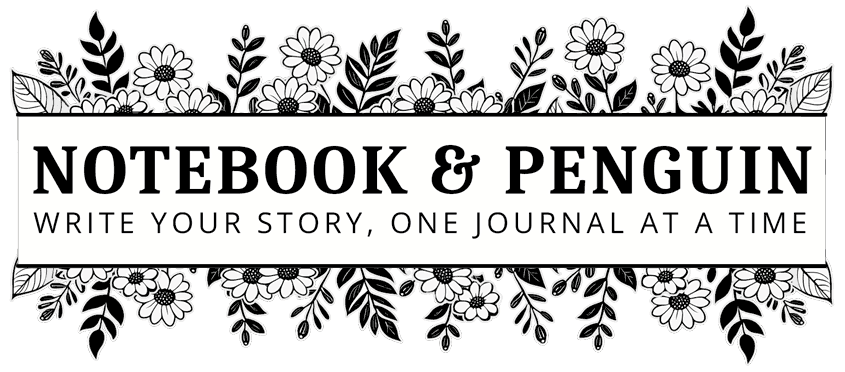

How To Start Journaling: The Best Journal Writing Guide For Beginners
I remember the first time I tried to start a journal, I was in my early 20s and I had just read a book that recommended journaling as a way to process thoughts and emotions. I was really skeptical at first but decided to give it a try anyway. I grabbed a rather beautiful notebook that I’d been given for Christmas a few years before, picked up my pen, and stared at the blank page in front of me. I’m not going to lie, it was awkward!
I didn’t know how to start journaling!
I didn’t know what to write about, or how to express myself. I had no idea where to start with my first journal entry. I then also realized that I really didn’t want to mess up the beautiful journal in front of me – the pressure was intense!
After a few minutes (that felt like years) I placed my pen on the paper and started writing about how nervous I was about writing!
After a little while something unexpected happened. I started to feel a sense of calm and before I knew it, I had one full page of writing!
Was it good? No.
Was it eloquent? No.
Was it masterful and life-changing? Also no!
Would someone who read it think I was crazy? Absolutely yes!
But it was a start!
Over the years I’ve continued to journal. I wish I could say that I’m 100% committed to the process but sometimes life gets on top of me and I’ll go weeks without writing a single thing. But, whenever I come back to it, I’m always surprised by how much it helps me!
In this article, I want to help you start your journal if you are a beginner. And trust me, once you’ve done your first page, it becomes a whole lot easier so let’s get started!
But before we begin…
Journal Writing and Its Benefits
If you are here then I’m sure you already know what journaling is and you probably also have a good idea of what its benefits are.
But if you would like a refresher, then check out my two previous articles, “What is Journaling and Why Should You Try It?”, and “15 Amazing Benefits Of Keeping A Journal“.
How To Start Journaling
Let’s jump into getting you started with your first journal entry! As a journaling beginner, I know that starting a journal can feel really intimidating so I’ve tried to create a step-by-step process that you can follow to try to make it a bit easier.
Need some ideas about the different types of journals that you can start? Check out this article: 35+ Different Types Of Journals To Keep
Choose A Journal
I don’t know about you but when I was a kid I used to love shopping for new stationery at the beginning of the school year. It was so exciting! It was like a fresh start and a new beginning. As an adult, I still love choosing new notebooks and stationery!
But where do you start when choosing a journal? My recommendation is to choose something that fits your personality and gives you that warm and fuzzy feeling when you look at it. Your journal is going to be like a loyal companion to you so the very last thing you want is a notebook that you hate looking at!
And if you feel inspired, you can also choose colorful markers and pencils to add to your journaling stash!

Make your journaling journey even more special with one of our personalized journals!
That said, of course you don’t need a fancy notebook or stationery to start your journal. If you are just starting out, start with anything you have! It might actually be easier with a notebook that you don’t consider beautiful or special.
Remember how much I didn’t want to mess up my beautiful first journal?
Don’t be me!
If you feel a bit overwhelmed by the idea of filling the big blank pages in an A4 notebook or journal then choose a smaller notebook that is easier to fill and less intimidating.
Setting A Journal Writing Routine
As a beginner, consistency is the key when it comes to journaling! So the easiest way to get started is by choosing a time and place where you can write in your journal peacefully and without distractions.
This could be first thing in the morning, before bed, or even during your lunch break. Just choose a time that you know you will be able to stick to on a daily basis.
Remember, you don’t want journaling to become a chore so choose a time when you won’t feel rushed or pressurized!
Once you have decided on a time, commit to sticking to it, and if necessary, set a reminder on your phone so that you don’t forget!
And, if you feel that writing on a daily basis is too much, then set a routine that is easier to stick to even if it’s just journalling a few times a week. The trick is to get into a routine that you can stick with.
And what if you don’t feel like writing on a particular day? Don’t beat yourself up about it. Simply journal in your next timeslot… or! Open your journal and write about why you don’t feel like writing on that day… even if it’s short and sweet!
Writing Your First Journal Entry
You’ve got your journal, you’ve got your pens and other stationery, now where do you begin?
Some people find that a great way to start their journal is by decorating their first page.
This is a fun way to get your feet wet without committing to actually writing anything!
Plus you get that “I’m going to mess up this beautiful journal” feeling out of the way. But remember, journaling is all about you so, if you don’t want to decorate the first page, then skip this bit.
Decorating Your First Page
Decorating your first journal page is a great way to make your journal feel more personal and special. Here are some ideas to get you started:
- Use Colorful Pens or Markers – You can get started by writing your name or a quote that inspires you in bright colorful letters using pens and markers that you love. Get color palette ideas here!
- Add A Doodle or Sketch – Adding drawings and sketches that you’ve drawn is a great way to make your journal feel even that much more personal.
- Stickers and Washi Tape – You can use stickers or washi tape to add color and interest to your first page. You can also use them to create a border or frame around your page.
- Use Stamps or Stencils – If you have a stamp or stencil collection then use them to add patterns, images, or words to your page.
- Add a Collage – You can create a collage using images, words, or other things that inspire you! This is a great way to celebrate your personality and interests.
- Add a Quote or Lyrics – If you have a quote or specific lyrics that inspire you then add those to your page, and decorate around them with colors, doodles, stickers, and other fun things.
- Create a Vision Board – A great way to start your journal is by using your first page as a vision board where you can include images and words that represent your goals and dreams.
- Play WIth Fonts – Sometimes you might find it easier to create headings or titles in Word or Canva. Doing this allows you to play with different fonts and print out pages you can stick inside your journal (check out some awesome free font ideas here).
- Keep It Simple – Don’t feel like you need to over-decorate your first page – sometimes simplicity is best! Remember that the most important thing is to have fun and make your journal your own!
Let Go Of Any Preconceived Ideas You Might Have
Before you start your journal you must remember this…
There is no right or wrong way to journal!
Say it with me, “There is no right or wrong way to journal” 🙂
Okay great, I’m glad that is out of the way.
Oh and before I forget…
Your journal is personal and for your eyes only!
When you start journaling you might need to make a conscious effort to let go of the idea that someday someone might read your personal journal.
I remember that this is one of the things that held me back from truly expressing myself when I first started journaling! Subconsciously I was scared that someone would find my journal and read it – I would then be incredibly embarrassed and would need to move to another town!
I get it, the fear is real!
I really had to learn to let go of the idea that someone might see my writing and you will need to do the same because you’ll never be able to fully express yourself as long as you hang onto the idea that someone is going to read your personal journal. And if all else fails, hide your journal under your mattress or in the ceiling!
Start Writing!
As I mentioned before, there is no right or wrong way to journal so you really can do anything you like!
Some people like to start their daily entries by recording the date at the top of the page so that their journal becomes almost like a diary. Others like to divide up their personal journals into categories or sections where they can record or write about specific things such as what they are grateful for.
Although there is no “proper” way to start journaling here are a few suggestions on what to write when you begin writing in your journal:
Write A Letter To Your Future Self
Write a letter to yourself a year from now. Write about your hopes, dreams, goals, and aspirations and what you hope to achieve in the coming year. Write as if you are writing to a special friend or family member that you love deeply and trust completely. Someone who doesn’t judge or criticize.
Take this idea a step further and write letters to people in your life. This is a great way to explore how people make you feel.
For example, if someone has hurt you, write about what happened and why you feel the way you feel. Likewise, if someone is an important, loving part of your life, write a letter to them expressing why you love them.
Remember that these people will never see your letters so you can be completely open and honest.
Create A Bucket List
Create a bucket list of things that you want to achieve or experience both in the coming year and in the future. Make notes to explore why these goals and experiences are important to you.
Once your bucket list has been created. Go through each item and write about how you will feel once you have achieved specific items on the list. And if you like, add pictures and drawings that inspire you!
Self Discovery
Write down any traits or qualities that you love about yourself. Describe your talents, gifts, beliefs, hopes, and dreams. Here you can also explore your fears and anxieties.
You can also write about the things that you don’t like about yourself and how you want to work towards becoming a better person. You can also write about things that you would like to learn or explore about yourself.
Another great way to start writing is to close your eyes, take a few deep breaths, and in your journal describe how you are feeling at this moment. You can also write about the thoughts that are circulating in your mind as you begin writing.
Favorite Memories
Begin your first personal journal entry by writing about your favorite memories. Think back to when you were younger and write about the happiest times you can remember. You can also include what made each of these memories so special for you.
Future Aspirations
Write about what your perfect day would look like in five years’ time. Record everything from what you will have for breakfast or who you will spend time with. You can include steps you can take today to help you move closer to that ideal day.
Thankfulness & Gratitude
Start your journal by writing down some of the things you are most grateful for today. Write about how each of those things makes you feel and why you are so grateful for them.
If there are specific people that you are grateful for, write about why these people are so special to you and how they make you feel. Write about ways that you can show them how much they mean to you.
Reflect On Your Day
One of the best ways to start your journal is simply by reflecting on what happened during your day. What were the highlights and what were the challenges? Were there any particular moments that stood out and how did they make you feel?
Creative Expression
Imagine that your emotions and feelings are colors. What colors would they be? Create drawings and sketches to represent how you feel in the moment using some of the colors you’ve chosen.
Brain Dumping
Brain dumping is where you simply write, you don’t think, you just write! If you find it tricky to start then set a timer on your phone for a few minutes, turn your brain off, and just write.
Don’t think, don’t edit, don’t worry about spelling, just write.
After your timer goes off you can continue writing if you would like to, otherwise you can stop and reflect on everything you have written during your session.
Prompts To Get You Started
If you still feel a bit stuck with getting started with your personal journal, then here are a few beginner prompts to help you. Write these prompts down in your journal and then write your responses underneath them.
Remember that journaling is a safe space for you to express yourself honestly. Don’t worry about grammar, spelling, or how your writing flows. Write freely and without judgment by allowing your thoughts and feelings to flow onto the page.
Today I am Feeling…
This prompt can help you check in with your emotions and reflect on your current state of mind.
I Am Grateful For…
This prompt can help you create a sense of gratitude and appreciation for all the good things you have in your life.
Explore how to include gratitude in your journaling with our giant list of over 300 Gratitude Journaling Prompts
My Goal For The Next 30 Days Is…
This prompt can help you set a short-term goal for yourself. Of course, your journal is also a great way to track your progress!
I Am Proud Of…
This prompt can help you reflect on your accomplishments and build your self-confidence.
I Am Looking Forward To…
This is a great prompt to help create a sense of excitement and positivity in your life. By using this prompt you can explore why the things you are looking forward to are important to you and how you can create more of them in your life.
My Favorite Memory From My Childhood Is…
This prompt is a great way to tap into your nostalgia and reflect on happy memories of the past.
I Am Currently Reading/Watching/Listening To…
This is a wonderful prompt that helps you reflect on your current interests and hobbies and it can help you explore new ones.
My Favorite Quote or Mantra Is…
This prompt can help you reflect on your values and beliefs and provide inspiration and motivation for your journaling journey
I Am Feeling Stuck/Overwhelmed/Frustrated because…
This prompt can help you identify and explore areas of your life where you may be struggling and it can give you space to brainstorm solutions and strategies to help you overcome those challenges.
My Dream Job/Vacation/Adventure Is…
The prompt helps you to think about your aspirations and dreams. It also gives you the space to brainstorm ways to make them a reality.
Need more prompts? Get Hundreds Of Prompts In Our Free Prompt Library!
Journaling Tips For Beginners
If you are new to journaling it is important to keep a few things in mind to make the most of your experience. Here are some tips to help you get into it.
Don’t Compare Yourself To Others
Remember that everyone’s journaling journey is unique so don’t get caught up in comparing yourself to others. Don’t worry about how often other people journal, how long their journal entries are, or how “good” their writing is. Focus on yourself and let your journaling evolve naturally.
Set Small Achievable Goals For Yourself
Don’t feel you must journal for hours a day. Set yourself small, achievable goals such as writing for 5 to 10 minutes a day and gradually increase your time as you become more comfortable.
Allow Yourself To Write Freely
Journaling is a safe space for you to express yourself freely and honestly. Don’t worry about grammar, spelling, or how your writing flows.
Use Promps or Templates
If you are struggling to come up with ideas to write about then use prompts or templates to get you started. You can find prompts and templates online or you can create your own based on your interests, feelings, or experiences.
Our Prompts Library Contains Free Prompts For The Following Topics:
Journal With A Friend
When you start journaling it can be great to get started with a friend who can give you support. You can share ideas, prompts, and feedback with each other and you can encourage each other to keep going.
Track Your Progress
Keep track of your journaling by marking off days on a calendar or using an app to help you. Use reminders on your phone to keep you on track. This will help you make journaling a consistent part of your routine.
Choose a Quiet, Comfortable Place To Write
Find a place to write that is quiet and comfortable so that you can focus without distractions. This could be your bedroom, a park, or even a cozy local coffee shop.
Be Patient and Kind To Yourself
Remember that journaling is a habit that takes time to develop. Be patient and kind to yourself as you start to journal and don’t get discouraged if you miss a day or two – simply get back on track and keep moving forward.
Things That Might Be Holding You Back From Learning To Journal
If you’ve made it this far then that means you are really committed to starting to journal! That’s great. However, there might still be some things that are holding you back from getting started. Let’s take a look at some common things that people experience and how you can overcome them:
Fear Of Not Doing It “Right”
There’s no right or wrong way when it comes to journaling! Just write! If you are feeling stuck try brain dumping or freewriting where you write whatever comes into your mind without stopping or worrying about things like spelling or grammar.
Lack of Time
“I don’t have time to journal” is a common excuse. But if you think about it, journaling can actually save you time in the long run by helping you prioritize your thoughts, feelings, goals, and priorities. Start small with only a few minutes a day and don’t beat yourself up if you miss a day or two.
Self-Criticism & Perfectionism
Trust me, it is really easy to get caught up in self-criticism, especially when it comes to something like journaling.
Remember it’s okay not to be perfect.
Trust the process and don’t be too hard on yourself. It’s okay to make mistakes, write messily, or have unfinished thoughts and pages. The goal of journaling is to learn and grow not to create a perfect work of art so enjoy it!
Lack Of Motivation
It is very normal to feel unmotivated sometimes, especially when you are just starting to journal.
You can overcome this by committing to writing for a few minutes, a couple of times a week. You can also find an accountability partner by journaling with a friend or joining a journaling group.
Difficulty Expressing Your Emotions
Journaling is an emotional experience and it can be difficult to express your emotions especially at first. It is okay to take your time and start small.
Try starting by writing about your day and as you get used to writing, you can gradually explore deeper emotions and topics.
Privacy Concerns
We’ve spoken about this one already but if you are still concerned that someone is going to read your journal then you could consider using a password-protected digital journal or a journal with a lock.
You can also try using pseudonyms when writing about people so that if someone does read your journal they won’t know who you are talking about.
Feeling Overwhelmed
Although journaling can be a powerful tool for self-reflection, it can also feel overwhelming sometimes. If you are feeling stuck or overwhelmed, try breaking your journaling down into smaller more manageable chunks.
For example, write three things you are grateful for in the morning and then write about your day in the evening.
Try brain dumping or freewriting with a stopwatch to get you unstuck.
Journaling Is A Journey, Not A Destination
Conclusion
Remember, journaling is a journey, not a destination. It is a habit that needs commitment, patience, and kindness. Be gentle with yourself as you start your journal and don’t be scared to explore new methods and techniques.
As you continue to write in your journal it will become easier and you will find that it becomes a great tool for making your way through life. You will find it a great help with facing difficult decisions, struggling with setbacks, and even celebrating successes!
I hope this article has helped you if you have been stuck on how to start journaling! I’d love to know if you managed to get started or if you need help. Let me know in the comments section below!


